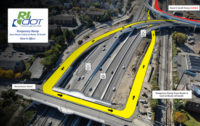As Rhode Island riders begin taking advantage of the recently opened $63-million Pawtucket-Central Falls Transit Center, the contractor for the long-awaited project is contesting allegations that it illegally disposed of contaminated land fill from the project on its nearby Providence highway project site.
Barletta Engineering Heavy Division pleaded not guilty on Feb. 1 in Providence County Superior Court to two counts of illegal disposal of solid waste, one count of operating a solid waste management facility without a license and one count of providing a false document to a public official.
Barletta was charged with transporting thousands of tons of contaminated land fill from the Pawtucket-Central Falls Transit Center and sites in Boston and illegally disposing them at the 6/10 highway project in Providence, a project Barletta is also serving as the lead contractor. In a Jan. 18 statement, Barletta said it “respectfully rejects the criminal charges.”
A Barletta spokeswoman told ENR on Feb. 1 that the firm has "nothing new to add today."
The Canton, Mass-based firm's former project superintendent, Dennis Ferreira, has also been charged with illegal dumping. Ferreira is scheduled to be arraigned on Feb. 7.
Reportedly remaining on both the $410-million 6/10 highway job and the transit center despite the lawsuit, Barletta is also building a $5-million parking lot for the transit hub that is scheduled to finish in March. It will provide free parking for 200 cars.
The overall transit center project, which was originally slated to be completed in July 2022 after starting in 2018, was delayed due to material supply chain delivery issues. It is now set for completion by March 31.
Remaining tasks includes installation of glass panels, fencing, permanent lighting for the parking lot and miscellaneous signage. “The punch list hasn’t been developed, but all work will be done this spring,” says St. Martin.
The station includes dedicated platforms for northbound and southbound service, connected by a glass-enclosed pedestrian bridge, elevators, ramps and stairs. The bus hub includes five berths with covered shelters for passengers, as well as bicycle racks in the hub’s plaza area. The hub also connects to a transit corridor, which includes dedicated bus lanes and bike lanes linking the facility to downtown Pawtucket.
The transit center will allow riders to easily move between commuter rail operated by the Massachusetts Transportation Bay Authority (MBTA) and Rhode Island Public Transit Authority (RIPTA)’s statewide bus network.
Construction Challenges
Building a station over an active train line was most challenging for the project team, St. Martin says. It “often required coordination with Amtrak officials to de-energize the high-voltage catenary lines before doing certain types of construction on the station,” he says. “These windows of time happen overnight when trains are not running and are brief… At times, partly due to COVID and other workforce issues, they have not had as many hours available as previously.”
The station "will add to the quality of life in Pawtucket and the Blackstone Valley," Rhode Island Gov. Dan McKee (D) said in a statement and "will also dramatically expand transit options for Rhode Islanders and those visiting Rhode Island.”
More than two-thirds of the project cost, about $43 million, was paid for with federal funds, including a $13.1-million Transportation Investment Generating Economic Recovery (TIGER) grant, and a $7-million Bus and Facilities Grant, both from the Federal Transit Authority, and $20 million as part of the FTA’s Congestion Mitigation and Air Quality (CMAW) Improvement Program, the statement notes.
The more than century-old Pawtucket-Central Falls Railroad Station, northeast of the new station, was designed by F. W. Mellor, architect for the New Haven Railroad, and was once a Beaux-Arts work of civic pride in the historic textile center. Since its closing in 1959, a 1978 redevelopment plan failed and many ideas have been studied, including keeping the rail stop as a station. RI DOT does not own the property, and plans for renovation or demolition of the building are not part of the new station project, St. Martin says.
.jpg?1675343845)



